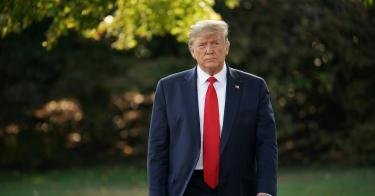Usama bin Laden’s son Hamza was reportedly one of 56 children of the Al Qaeda leader and joined the family business of terrorism and murder. President Trump confirmed Saturday that Hamza followed in his father’s footsteps to the bitter end, dying in a U.S. counterterrorism raid.
Usama bin Laden, who ordered the Sept. 11, 2001 terrorist attacks against the U.S. that killed nearly 3,000 people, was killed in a raid in Pakistan by Navy SEALS in 2011.
Hamza bin Laden, believed to be about 30, was rather special. He had been promoted as a significant leader in Al Qaeda and was a poster child for a promising future for the transnational terrorist organization.
But Hamza won’t have the opportunity to wage jihad any longer.
Hamza "was killed in a United States counterterrorism operation in the Afghanistan/Pakistan region," President Trump said in a statement, pointedly not identifying which country.
“The loss of Hamza bin Laden not only deprives Al Qaeda of important leadership skills and the symbolic connection to his father but undermines important operational activities of the group,” the president added. “Hamza bin Laden was responsible for planning and dealing with various terrorist groups.”
The killing of the younger bin Laden reminds us once again that the fight against transnational terrorism – which includes Al Qaeda, ISIS and many other groups – is not yet over. Taking out terrorist leaders and high-profile assets remains an important tactic in the ongoing battle to diminish the threat.
What many are puzzling over is why President Trump chose to talk about Hamza’s killing Saturday – since the news was first reported in July.
Hamza’s death was certainly newsworthy and kind of a big deal. Calling attention to his death while the memory of the 18th anniversary of the 9/11 attacks is still fresh on American minds may help reassure folks that our government hasn’t forgotten who took down the Twin Towers.
And no, it wasn’t some magical self-aiming airplanes that hit the World Trade Center, as The New York Times would have us believe.
Hearing that Hamza suffered the same fate as his father reminds people that our government is still on the case of the terrorists who would be happy to attack us again.
In the wake of the recent controversy involving the Taliban terrorists who gave Al Qaeda a safe haven when the Taliban ruled Afghanistan before 9/11, perhaps Trump wanted to make the point he has not misplaced his priorities in the fight against Islamist terrorism.
The president was criticized by some for even thinking about bringing the Taliban to Camp David last weekend for peace negotiations, just days before the 9/11 anniversary.
It makes no sense to suggest that President Trump wanted to negotiate with the Taliban a week ago to dishonor the memory of the victims of 9/11. He is a native New Yorker and lived not far from the World Trade Center at the time of the attacks. Al Qaeda would have been happy to murder him and his family along with all its other innocent victims.
There was logic to trying to bring both the Afghan government and the Taliban terrorists together to Camp David. Trump had still not seen the final proposed peace deal that was being put on the table and it was still an open question whether he would have signed off.
But a peace deal made no sense unless the U.S. made clear it was a deal for a peace that was conditions-based, not a green light for the Taliban to overrun Afghanistan – which is what the Taliban want to do.
In bringing both sides to Camp David, Trump could have used the symbolism of the Camp David accords and the Israeli-Egyptian peace process, reminding both sides that the U.S. expectation was that this would be the beginning of a real peace process.
But Trump was dead right to pull the plug on the meeting and put the peace initiative on hold when the Taliban launched an attack killing an American serviceman. Message to the Taliban: Don’t call until you are ready to take the peace process seriously.
Last week also brought another development on the foreign policy front: the departure of National Security Adviser John Bolton.
Many wondered what effect – if any – that might have on for future U.S.foreign and security policy. Trump’s reminder of Hamza bin Laden’s demise may be his way of signaling the answer is “not much.” It certainly suggests that the president has no interest in going soft on terrorism.
Trump’s foreign policy has always been Trump’s foreign policy. If it’s tough, it’s because he is tough. If we are taking out terrorists, it’s because he wants our side to be taking out terrorists. He doesn’t need a national security adviser to give him a backbone.
Trump is also not afraid to engage in diplomacy and do a deal – if there is a good deal to be done, which means a deal that safeguards and protects America’s interests.
Hamza bin Laden is dead because he threatened America and got in Trump’s way. That’s something America’s enemies would be wise to remember.
This piece originally appeared on Fox News




